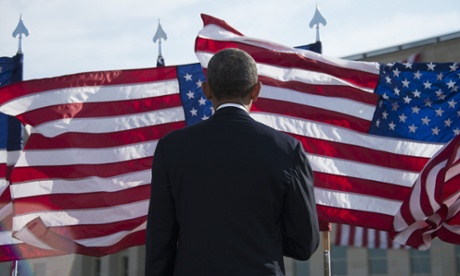
They were both solemn, presidential addresses to the nation: delivered from the White House at 9.01pm precisely, to ensure a primetime television audience. The speeches were a year apart, but occurred on the same date: the eve of September 11.
Twelve months ago, Barack Obama was stepping back from military intervention – in this case, strikes against Syrian government forces over the use of chemical weapons – telling the nation he had a “deeply held preference for peaceful solutions”.
But fast-forward a year, and a very different president was on show to announce a starkly different decision. Wednesday’s address showed Obama as the commander-in-chief, declaring a “systematic campaign of air strikes” on jihadists in Iraq, Syria and quite possibly elsewhere.
White House aides insist the two speeches cannot be easily compared. The war Obama rowed back from against Syria’s Bashar al-Assad was different from the one he has decided to escalate against the Islamic State (Isis) militant group in Iraq and now Syria.
Yet in launching a sustained military campaign against Isis, Obama has abandoned the position he adopted just a year ago. The subtle but important shifts in the president’s position over the past year point to his reluctant and unexpected conversion from dove to hawk.
Decision on military action
In his 2013 address, Obama informed the nation that he had asked Congress “to postpone a vote to authorise the use of force” against Assad’s forces, in favour of a diplomatic path. At the time, Obama had been considering using military force against Syrian government forces over their use of chemical weapons.
The president was reluctant to get involved in a complex civil war, which at that point had claimed 100,000 lives. “I have resisted calls for military action, because we cannot resolve someone else’s civil war through force, particularly after a decade of war in Iraq and Afghanistan,” he told the nation.
Obama was politically isolated, unable to conjure broad international support or congressional backing. He had already announced he would seek congressional authorisation before launching strikes – a move widely seen as backing down. Then, two days days before the big speech, Obama’s secretary of state, John Kerry, stumbled on a potential diplomatic solution involving Russia supervising the removal of Assad’s chemical arsenal. The White House saw a way out of war, and pounced.
Announcing the decision to the nation, Obama memorably remarked: “I’ve spent four and a half years working to end wars, not start them.”
In contrast, the speech given by Obama on Wednesday was, in all but name, a declaration of war. The military campaign against Isis in Iraq has been under way for weeks. But Obama significantly broadened the scope of that military action, announcing a campaign of air strikes, and an increase in support to Iraq and Syrian factions responsible for the ground offensive to Isis, referred to by the White House as Isil.
“I can announce that America will lead a broad coalition to roll back this terrorist threat,” Obama said on Wednesday. “The objective is clear: we will degrade and ultimately destroy Isil.”

Prolonged air campaign
The military action under consideration against Assad would have been, by Obama’s admission, “limited in duration and scope”. When he used his 2013 address to announce that even those strikes had been shelved, Obama made a series of pledges he may now come to regret.
“I will not put American boots on the ground in Syria,” he said. “I will not pursue an open-ended action like Iraq or Afghanistan. I will not pursue a prolonged air campaign like Libya or Kosovo.” Twelve months later, Obama maintains there will be no combat troops in the region, insisting that the more than 1,000 military personnel deployed to Iraq in recent months are either protecting US facilities, or there in an advisory capacity.
However, Obama’s promises not to pursue an “open-ended action” or a “prolonged air campaign” are at odds with the military campaign he announced on Wednesday. Obama did not put a time limit on the new offensive against Isis, but suggested it would be comparable to those “pursued in Yemen and Somalia”, both of which have been open-ended, prolonged campaigns involving air strikes which continue to this day.
A senior White House official explained: “The goal is to degrade and ultimately destroy this organisation, but we’re not going to put a fixed date for the accomplishment of that goal.”
Obama’s claim that this assault will be comparable to those under way Yemen and Somalia has proved controversial. US strikes in those countries have not involved the degree of sustained involvement envisioned in Iraq and Syria, where there will be a huge push to arm, train and support opponents of Isis on the ground – including by training Syrian opposition groups in Saudi Arabia.
Either way, Obama, the president who 12 months ago pulled the US back from the cusp of a war – and who just three months ago was promising the US would not get “dragged back” into a military conflict in Iraq – now appears to be preparing the country for a long-haul campaign. “[It] will take time to eradicate a cancer like Isil,” he said on Wednesday.
Congressional approval
A central tenet of Obama’s decision on use of military force in 2013 was the importance of securing backing from Congress. Obama said he did not legally require legislators to launch strikes in Syria, but made the moral case for first securing its backing. Most observers believed Obama’s decision to seek congressional authorisation was a strategic manoeuvre from a by a president who searching for a route out of the conflict.
Nonetheless, in seeking congressional approval, Obama said in his 2013 speech that it was “right, in the absence of a direct or imminent threat to our security, to take this debate to Congress”. This time, Obama’s position has shifted. Even though there is no direct or imminent threat to US national security posed by Isis, the White House does not believe congressional approval is a prerequisite for strikes.
Obama did say on Wednesday that he would welcome congressional support – but that is very different from making congressional authorisation a condition for taking military action. The exception relates to the training and equipping of vetted Syrian opposition groups, a currently covert activity the White House will only expand with express support from the legislature.
America’s role in the world
Perhaps the most obvious difference between Obama’s two speeches is the way in which they depict America’s role in the world. The president who, in 2013, was standing down from military action, sounded reluctant to become embroiled in foreign conflicts, while insisting that the atrocities committed by Syrian forces demanded a response. Obama insisted the US could not stand by in the face of humanitarian catastrophes and had an obligation “when, with modest effort and risk, we can stop children from being gassed to death”.
But in the same breath he added: “America is not the world’s policeman. Terrible things happen across the globe, and it is beyond our means to right every wrong.”
On Wednesday, there was no such reference to the limits of American influence or responsibility from a president who was evidently determined to outline a tougher, more interventionist plan, willing to take the lead on a raft of global challenges, from Russia’s incursion in Ukraine to the outbreak of Ebola in Africa.
The message was clear. The president who for six years has been criticised as cautious, or even weak, was newly emboldened. “I have made it clear that we will hunt down terrorists who threaten our country, wherever they are,” he said. “That means I will not hesitate to take action against Isil in Syria, as well as Iraq. This is a core principle of my presidency: if you threaten America, you will find no safe haven.”















